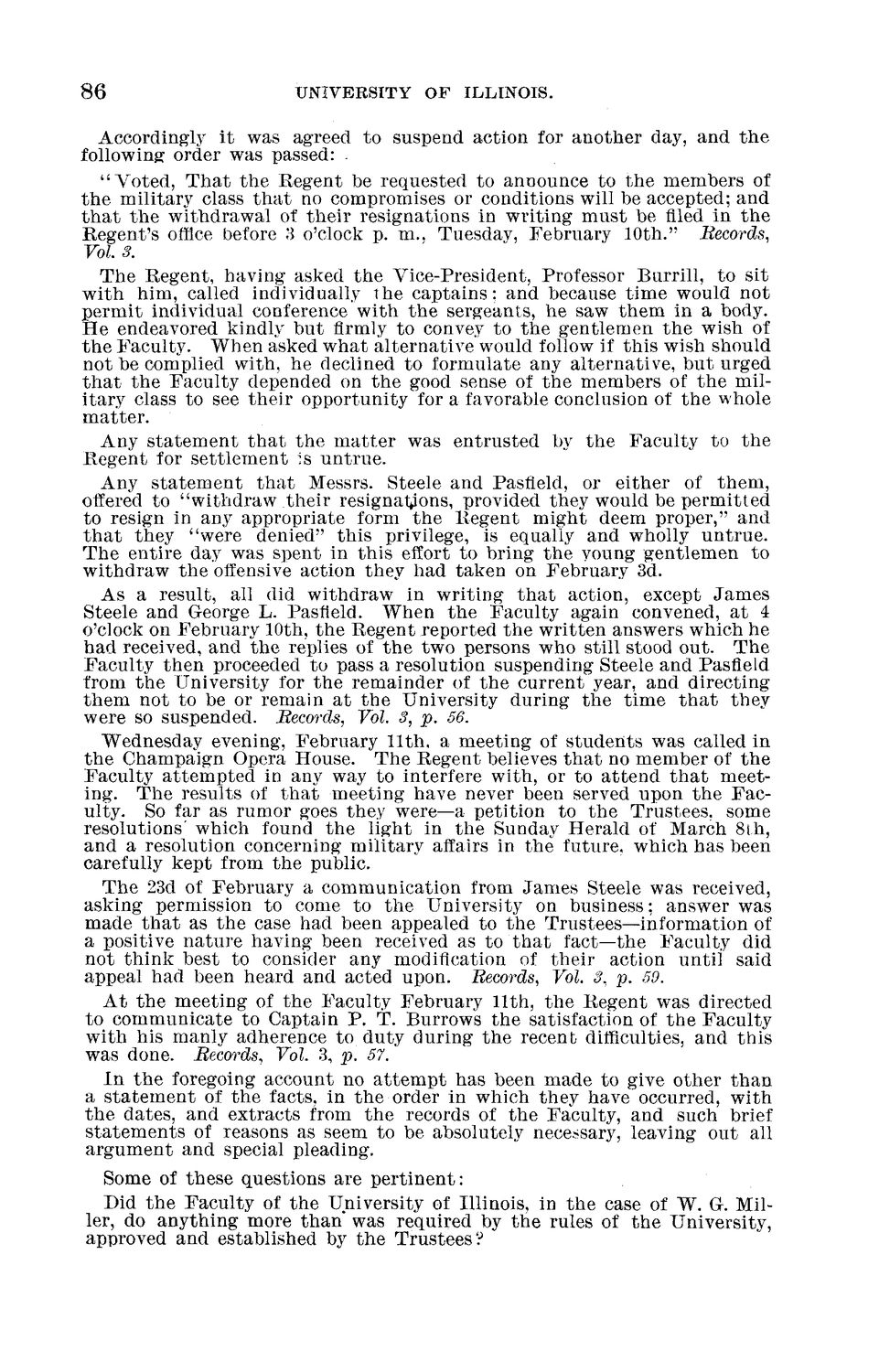| |
| |
Caption: Board of Trustees Minutes - 1892
This is a reduced-resolution page image for fast online browsing.

EXTRACTED TEXT FROM PAGE:
86 UNIVERSITY OF ILLINOIS. Accordingly it was agreed to suspend action for another day, and the following order was passed: . "Voted, T h a t the Regent be requested to announce to the members of the military class t h a t no compromises or conditions will be accepted; and t h a t the withdrawal of their resignations in writing must be filed in the Regent's office before 3 o'clock p. m., Tuesday, February 10th." Becords, Vol. 3. The Regent, having asked the Vice-President, Professor Burrill, to sit with him, called individually the captains; and because time would not permit individual conference with the sergeants, he saw them in a body. He endeavored kindly but firmly to convey to the gentlemen the wish of the Faculty. When asked what alternative would follow if this wish should not be complied with, he declined to formulate any alternative, but urged t h a t the Faculty depended on the good sense of the members of the military class to see their opportunity for a favorable conclusion of the whole matter. Any statement t h a t the matter was entrusted by the Faculty to the Regent for settlement is untrue. Any statement that Messrs. Steele and Pasfield, or either of them, offered to "withdraw their resignations, provided they would be permitted to resign in any appropriate form the Regent might deem proper," and t h a t they "were denied" this privilege, is equally and wholly untrue. The entire day was spent in this effort to bring the young gentlemen to withdraw the offensive action they had taken on February 3d. As a result, all did withdraw in writing t h a t action, except James Steele and George L. Pasfield. When the Faculty again convened, at 4 o'clock on February 10th, the Regent reported the written answers wrhich he had received, and the replies of the two persons who still stood out. The Faculty then proceeded to pass a resolution suspending Steele and Pasfield from the University for the remainder of the current year, and directing them not to be or remain at the University during the time t h a t they were so suspended. Becords, Vol. 3, p. 56. Wednesday evening, February 11th, a meeting of students was called in the Champaign Opera House. The Regent believes t h a t no member of the Faculty attempted in any way to interfere with, or to attend t h a t meeting. The results of t h a t meeting have never been served upon the Faculty. So far as rumor goes they were—a petition to the Trustees, some resolutions' which found the light in the Sunday Herald of March 8th, and a resolution concerning military affairs in the future, which has been carefully kept from the public. The 23d of February a communication from James Steele was received, asking permission to come to the University on business; answer was made t h a t as the case had been appealed to the Trustees—information of a positive nature having been received as to t h a t fact—the Faculty did not think best to consider any modification of their action untii said appeal had been heard and acted upon. Becords, Vol. 3, p. 59. At the meeting of the Faculty February 11th, the Regent was directed to communicate to Captain P. T. Burrows the satisfaction of the Faculty with his manly adherence to duty during the recent difficulties, and this was done. Becords, Vol. 3, p. 57. I n the foregoing account no attempt has been made to give other than a statement of the facts, in the order in which they have occurred, with the dates, and extracts from the records of the Faculty, and such brief statements of reasons as seem to be absolutely necessary, leaving out all argument and special pleading. Some of these questions are pertinent: Did the Faculty of the University of Illinois, in the case of W. G. Miller, do anything more than" was required by the rules of the University, approved and established by the Trustees?
| |